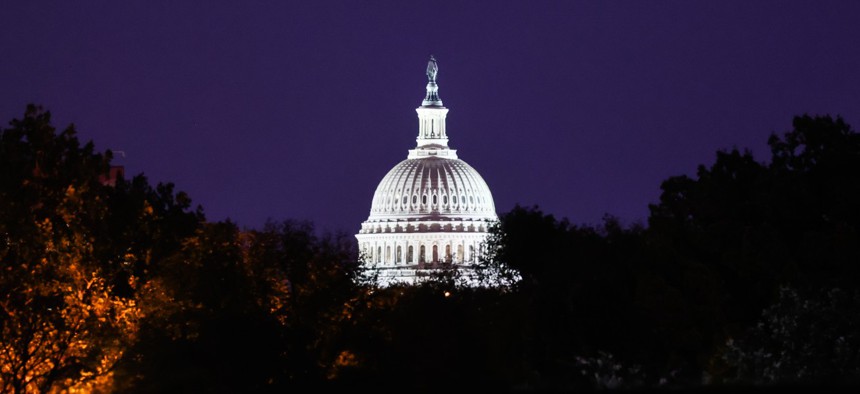
There is a narrow window to pass a bill before the end of the legislative session. Jakub Porzycki/NurPhoto via Getty Images
Federal Employee Advocates and Scholars All Are Urging Congress to Enact Anti-Schedule F Legislation
With the window to pass a bill preventing presidents from unilaterally creating new job classifications closing at the end of the year, good government and federal employee advocates warn of potential grave consequences for inaction.
Nearly 50 good government organizations, federal employee groups and other policy advocates on Thursday urged leaders in Congress to pass a measure before the end of the legislative session in December blocking Republican-led efforts to strip tens of thousands of career federal employees of their civil service protections.
In the waning days of his administration, then-President Trump signed an executive order establishing a new Schedule F within the federal government’s excepted service for federal workers in policy-related jobs and exempting the positions from most civil service rules. The edict instructed agencies to identify positions that would qualify for this new job classification and to convert employees in those jobs to Schedule F, effectively making them at-will employees.
Although two agencies submitted plans to reclassify a portion of their workforce—including the Office of Management and Budget, which slated 68% of its employees for conversion—ultimately no positions were reclassified before President Biden was sworn in, at which point the executive order was swiftly rescinded.
But earlier this year, reports indicated that conservative activists have continued to work on Schedule F and plan to be ready to re-institute the measure immediately upon the election of the next Republican president. That news triggered a renewed push by congressional Democrats to pass the Preventing a Patronage System Act, which would require congressional authorization prior to the establishment of any new job classification in the excepted service, including Schedule F.
The House included the legislation as part of its version of the fiscal 2023 National Defense Authorization Act, and Sens. Tim Kaine, D-Va., and Dianne Feinstein, D-Calif., have introduced an amendment that would attach the bill to the Senate version of the Defense policy legislation. Senators are also reportedly examining the possibility of including the legislation as part of an omnibus spending package required to keep the government open past December 16.
On Thursday, the National Active and Retired Federal Employees Association and Citizens for Responsibility and Ethics in Washington led 48 organizations—including federal employee unions and managers associations, good government and policy advocacy groups, as well as a dozen academics—in sending a letter to House Speaker Nancy Pelosi, House Minority Leader Kevin McCarthy, Senate Majority Leader Chuck Schumer and Minority Leader Mitch McConnell urging them to send the anti-Schedule F bill to Biden’s desk before the end of the congressional term in December.
“Every administration holds the authority to exercise its executive power appropriately,” the groups wrote. “But those powers are limited by the Constitution and laws of the United States. If government employees owe their jobs more to personal or political allegiance rather than merit, they will be more beholden to the party in power instead of the law of the land.”
The letter argued that the advent of Schedule F could also simply create a massive recurring logistical nightmare, causing agencies to grind to a halt after each change in administration.
“Normal due process safeguards ensuring termination for cause would no longer apply and these positions could be filled with handpicked and potentially unqualified individuals,” they wrote. “These hirings and firings, even on a small scale, would cause substantial disruption of government operations, forcing each new administration to spend additional weeks, if not months, dealing with the after effects of their predecessor’s decisions.”
And the repeated hiring and firing of these employees would lead to a long-term erosion in the quality of agency services across the federal government due to the brain drain caused by each quadrennial exodus, the federal employee advocates said.
“More substantial employee turnover from one administration to the next would also lead to loss of institutional knowledge and expertise within government,” the letter stated. “This would increase dysfunction and uncertainty in the disposition of the government’s responsibilities, including national security, health and safety, economic policy and the stewardship of trillions of dollars in annual federal spending. Staff shortages due to turnover and delays hiring and training each incoming administration’s new set of employees could cause further problems.”







